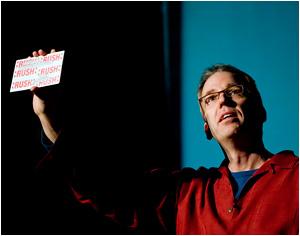By Katherine Duke '05
Frank Warren has close-cropped hair and a soft voice. He wears blue jeans and glasses. He looks like the average 40-something husband and father. But, as he knows better than anyone, outward appearances often conceal extraordinary stories. Warren is, in fact, the creator of a famous and influential blog; he has published four popular books and launched two travelling art exhibits. He has earned the title of “the most trusted stranger in America.”A simple idea that he set in motion a few years ago has since helped to change, and even save, lives around the world. Standing on stage in Johnson Chapel in front of a rapt audience, he introduced himself simply: “My name is Frank, and I collect secrets.”
 |
The postcards worked: first the secrets trickled in from around the D.C. area, and soon they were pouring in from different states, different continents. Warren began a PostSecret blog, publishing a small sampling of cards every Sunday. To date, he has received more than 300,000 secrets—as many as 200 each day, every one of which he reads and retains in a bin in his family’s house. As I was typing this sentence, the blog was viewed for the 222 millionth time.
During his hour-long presentation, Warren told us of the highlights of his involvement in the project: meeting people who have contributed secrets, inspiring a college student to “out herself” as an anorexic and to educate her classmates about eating disorders, assisting in a marriage proposal. He also showed us a few of the confessions that never made it onto the blog or into the PostSecret books. They’ve arrived not just on postcards but on X-rays, on deflated balloons, on banana peels and bags of coffee. Some are silly, such as the one that reads, “I like to watch Dr. Phil drunk.” (“I think there’s two ways you can interpret that,” Warren said, “and they’re both pretty funny.”) Others are tales of lost love and cries for help. One of Warren’s favorites is from a former patient in a mental health ward, now recovered; it ends with the message “There is hope.”
Having lost an uncle and a friend to suicide, Warren once volunteered for the National Hopeline Network, answering phones for a suicide-prevention hotline. Secrets about depression and self-harm show up in his mailbox with alarming frequency. He made the point that, in the United States, suicide is twice and common as homicide. “The statistics are even more staggering on college campuses,” he added. “In our group tonight, in the next 12 months, 50 of us will think about ending our lives. And six of you, right now, are sitting by somebody who will actually try.” The PostSecret project has raised awareness of this problem and more than $500,000 to help prevent it, with visitors to the blog at one point donating enough money to save Hopeline from imminent bankruptcy. Warren believes that keeping secrets sometimes contributes to feelings of frustration, isolation and hopelessness that can turn deadly. “Sometimes, when we think we’re keeping a secret,” he said, “that secret’s actually keeping us.” One of the most effective ways to help those in despair, he believes, is simply to listen—to let them bring forward whatever they’ve been holding back.
The evening included an opportunity for those in attendance to share their own secrets. (The audience consisted almost entirely of Amherst and Five College students, and, curiously, the vast majority were women.) Students lined up at two microphones—some to ask questions about PostSecret; several to thank Warren for his project; others to make confessions about everything from fashion to family to sexual assault. The crowd responded with applause and hugs. Warren closed by reading a postcard he was inspired to send to himself after a stranger’s secret reminded him of a trauma from his own childhood.
As the audience filed out to meet Warren and get their books signed, I noticed a young woman in front of me crying. She was releasing some powerful emotion (whether it was fear or grief or joy, and what exactly was behind it, I will never know), and she was leaning on a friend.